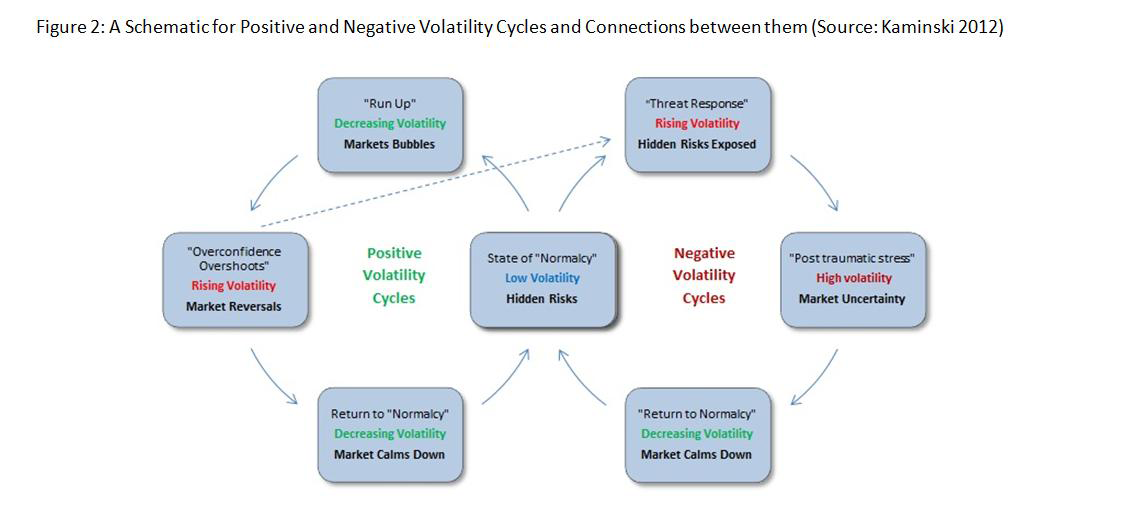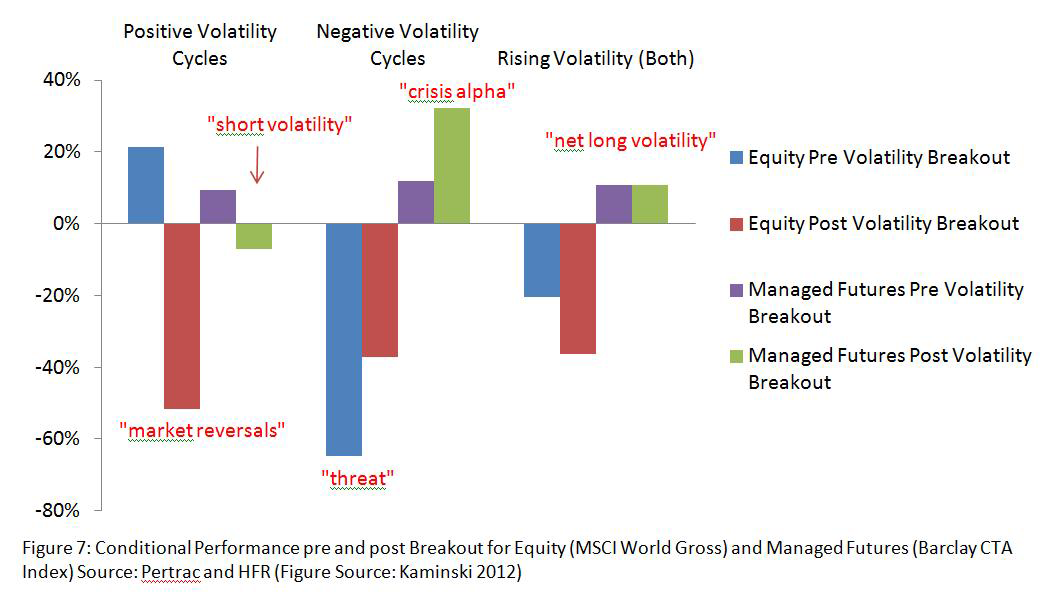Lackluster performance in the Managed Futures sector in 2011 has certain investors asking tough questions. The most common of these is related to volatility and the fact that during last year’s times of market turbulence CTAs seemed to struggle despite the fact that they are often sold under the tantalizing “long volatility” moniker. In a recent paper educational/thought piece for the CME Education Group, this complex or “convex” relationship is decomposed by volatility cycles to help clarify these issues.
Despite Managed Futures “long volatility” classification, volatility is truly of beast of its own, it is cyclical in nature similar to the booms and busts of equity markets, and it represents the markets perception of future uncertainty. Aggregating insights in behavioral and neurofinance, the cyclical nature of volatility may be driven by different cycles of human behavior initiated by either positive or negative stimuli. The core idea is that when we, as market participants, perceive success we become more certain (aka less volatility) and when we perceive threats we become more uncertain (aka more volatility). This means that risk taking is truly conditional on past experience consistent with what we, as practitioners, like to call “risk on – risk off”. Positive volatility cycles are driven by overconfidence, greed, and exuberance similar to a lucky gambler in a casino. Negative volatility cycles are driven by fear, anxiety, and distress. A schematic of volatility cycles and their connections is presented below.
The Managed Futures Volatility Relationship is, like most relationships, complicated.
If volatility is a product of market perceptions of future uncertainty framed by our past experience, a closer look at how Managed Futures performs over different types of cycles of volatility can help explain where the long volatility classification comes from.
Managed Futures strategies are futures based, highly liquid, regulated, low counterparty risk strategies. The Managed Futures (CTA Space) has generally been dominated by trend following strategies. They follow trends across the entire scope of futures investments including equities, fixed income, commodities, and currencies. Trend following is a technique of using past prices and data to determine positions based on a perceived trend in financial price data. A trend following approach will be most successful when there are trends in financial markets. Essentially, Managed Futures is an opportunistic strategy poised to profit from market inefficiencies in highly efficient futures markets. The most extreme state of market inefficiency is, of course, financial crisis where Managed Futures can sometimes deliver the ever-coveted “crisis alpha” opportunities. Crisis alpha opportunities are defined as profits which are earned from the persistent trends which occur during times of equity market crisis (See Kaminski 2011).
Past performance in periods of high volatility as well as academic studies noting the option-like characteristics of Managed Futures gave birth to its tantalizing “long volatility” moniker. Yet, in the context of volatility cycles, a simple analysis shows that Managed Futures is “net long volatility” with a catch. In fact, the strategy is both long volatility during negative cycles and short volatility, similar to many other hedge fund strategies, during positive volatility cycles (including market reversals). The performance during negative volatility cycles is driven by their access to “crisis alpha” whereas during positive volatility cycles they may be tackled by turbulence and coordinated market reversals. Putting all of this together, it is still clear that “crisis alpha” is driving much of the “long volatility” distinction.
Given this clarification, the paper also discusses the common hidden risks in hedge fund strategies including liquidity, credit, and volatility and how these risks relate to Managed Futures performance and the possibility to capture “crisis alpha”. In fact, since recent crisis events pale in comparison to 2007-2008, the competitive advantage of Managed Futures was less pronounced and potential crisis alpha opportunities may not have been easy for Managed Futures strategies to capture.
A Managed Futures strategy is reliant on the calm before the storm or on markets going back to a state of normalcy where investors become comfortable with risk taking again. This allows investors to forget about past losses and pile on new hidden risks unknowingly leaving them unprepared for the next financial storm that may lay ahead. Managed Futures strategies, being void of some of these hidden risks, will remain poised and ready to attempt to catch the “crisis alpha” opportunities in the rage of the next financial storm.
- English (UK)
- English (India)
- English (Canada)
- English (Australia)
- English (South Africa)
- English (Philippines)
- English (Nigeria)
- Deutsch
- Español (España)
- Español (México)
- Français
- Italiano
- Nederlands
- Português (Portugal)
- Polski
- Português (Brasil)
- Русский
- Türkçe
- العربية
- Ελληνικά
- Svenska
- Suomi
- עברית
- 日本語
- 한국어
- 简体中文
- 繁體中文
- Bahasa Indonesia
- Bahasa Melayu
- ไทย
- Tiếng Việt
- हिंदी
Is Volatility A Friend Or Foe?
Published 05/04/2012, 03:44 AM
Updated 07/09/2023, 06:31 AM
Is Volatility A Friend Or Foe?
Latest comments
Loading next article…
Install Our App
Risk Disclosure: Trading in financial instruments and/or cryptocurrencies involves high risks including the risk of losing some, or all, of your investment amount, and may not be suitable for all investors. Prices of cryptocurrencies are extremely volatile and may be affected by external factors such as financial, regulatory or political events. Trading on margin increases the financial risks.
Before deciding to trade in financial instrument or cryptocurrencies you should be fully informed of the risks and costs associated with trading the financial markets, carefully consider your investment objectives, level of experience, and risk appetite, and seek professional advice where needed.
Fusion Media would like to remind you that the data contained in this website is not necessarily real-time nor accurate. The data and prices on the website are not necessarily provided by any market or exchange, but may be provided by market makers, and so prices may not be accurate and may differ from the actual price at any given market, meaning prices are indicative and not appropriate for trading purposes. Fusion Media and any provider of the data contained in this website will not accept liability for any loss or damage as a result of your trading, or your reliance on the information contained within this website.
It is prohibited to use, store, reproduce, display, modify, transmit or distribute the data contained in this website without the explicit prior written permission of Fusion Media and/or the data provider. All intellectual property rights are reserved by the providers and/or the exchange providing the data contained in this website.
Fusion Media may be compensated by the advertisers that appear on the website, based on your interaction with the advertisements or advertisers.
Before deciding to trade in financial instrument or cryptocurrencies you should be fully informed of the risks and costs associated with trading the financial markets, carefully consider your investment objectives, level of experience, and risk appetite, and seek professional advice where needed.
Fusion Media would like to remind you that the data contained in this website is not necessarily real-time nor accurate. The data and prices on the website are not necessarily provided by any market or exchange, but may be provided by market makers, and so prices may not be accurate and may differ from the actual price at any given market, meaning prices are indicative and not appropriate for trading purposes. Fusion Media and any provider of the data contained in this website will not accept liability for any loss or damage as a result of your trading, or your reliance on the information contained within this website.
It is prohibited to use, store, reproduce, display, modify, transmit or distribute the data contained in this website without the explicit prior written permission of Fusion Media and/or the data provider. All intellectual property rights are reserved by the providers and/or the exchange providing the data contained in this website.
Fusion Media may be compensated by the advertisers that appear on the website, based on your interaction with the advertisements or advertisers.
© 2007-2024 - Fusion Media Limited. All Rights Reserved.
